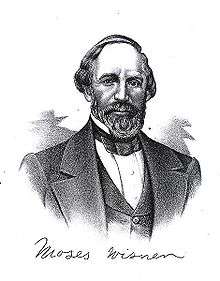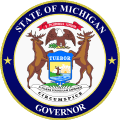Moses Wisner
| Moses Wisner | |
|---|---|
 | |
| 12th Governor of Michigan | |
|
In office January 5, 1859 – January 2, 1861 | |
| Lieutenant | Edmund B. Fairfield |
| Preceded by | Kinsley Bingham |
| Succeeded by | Austin Blair |
| Personal details | |
| Born |
June 3, 1815 Springport, New York |
| Died |
January 5, 1863 (aged 47) Lexington, Kentucky |
| Political party | Republican |
| Spouse(s) | Angeolina Hascall |
Moses Wisner (June 3, 1815 – January 5, 1863) was a politician and soldier from the U.S. state of Michigan.
Early life in New York
Wisner was born in Springport, New York, descendant from a family from Switzerland which emigrated to America in the early 1700s and settled in Orange County, New York. One of Wisner's distant relatives is Henry Wisner, delegate from New York to the Continental Congress and major participant against the British in the American Revolution.[1]
He received an education in the common schools while working on his parent's farm. In 1837, he moved to Michigan and settled on a farm in Lapeer County. Two years later, he gave up on farming and moved to Pontiac, Michigan.
Life and politics in Michigan
He studied law while working at the law firm of his brother, George W. Wisner, and Rufus Hosmer. In 1841, he was admitted to the bar at Pontiac and then moved to the village of Lapeer, Michigan to begin to a practice. He was appointed prosecuting attorney for Lapeer County in 1843 by Governor William Woodbridge. He moved back to Pontiac to join a law firm there.
Wisner was not especially active in politics until after the election of U.S. President Franklin Pierce in 1852, when he became active in the anti-slavery movement. He was one of the foremost critics in Michigan of the Kansas-Nebraska Act of 1854 which repealed the Missouri Compromise and opened the territories to slavery. He participated in the first convention of the U.S. Republican Party in Jackson, Michigan in July, 1854 where he declined nomination as Michigan Attorney General. That same year he was an unsuccessful candidate from Michigan's 4th congressional district to the U.S. House against Democrat George Washington Peck.
In 1858, Wisner was elected the 12th Governor of Michigan by a large majority and served one term from 1859 to 1861. After his term was over he returned to his home in Pontiac and resumed the practice of law.
Death and legacy
In September 1862 during the American Civil War, Wisner worked to raise the 22nd Michigan Infantry and was commissioned a colonel, but was stricken with typhoid fever while en route to the regiment's deployment. He died at the age of 47 in a private home near Lexington, Kentucky, and left behind his wife, Angeolina Hascall, the daughter of General C. C. Hascall, of Flint, Michigan, and four children.
Moses Wisner is interred at Oak Hill Cemetery in Pontiac.
Wisner's Greek Revival-Style mansion in Pontiac, now called the Moses and Angeolina Hascall Wisner House, is listed on the National Register of Historic Places. This site is now a museum and cultural center, and it hosts occasional social gatherings including weddings and ice cream socials.
Wisner Township, Michigan, in Tuscola County is named after Moses Wisner. Wisner Stadium, a football stadium located in Pontiac, Michigan, is also named for Wisner.
References
- ↑ Wisner, George Franklin (1918-01-01). The Wisners in America and Their Kindred: A Genealogical and Biographical History. publisher not identified.
External links
- Biographical Portraits 1892 Portrait & Biographical Album of Genesee, Lapeer & Tuscola Counties, Chapman Bros.
- Political Graveyard
- Memorial Library
| Political offices | ||
|---|---|---|
| Preceded by Kinsley S. Bingham |
Governor of Michigan 1859–1861 |
Succeeded by Austin Blair |
